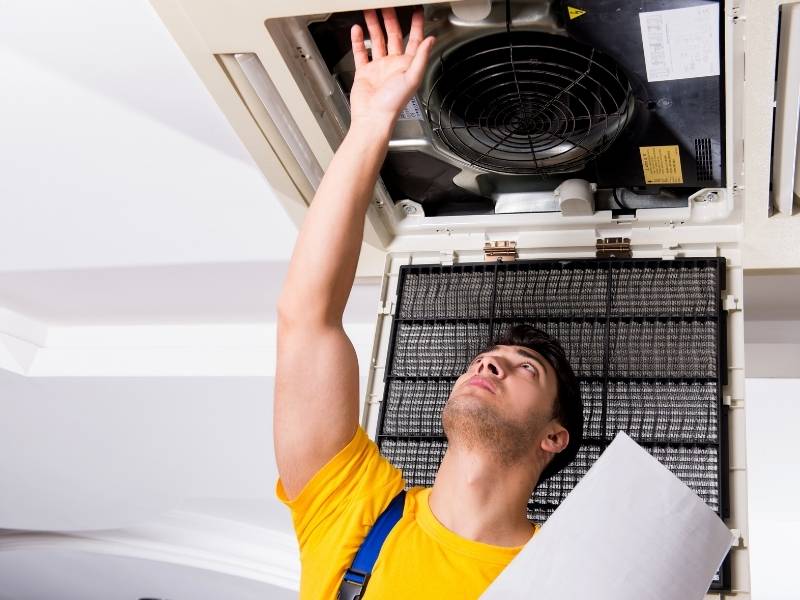There are many experts and professionals who, even though we need them regularly. But, people don’t know much about their professions. An HVAC mechanic is one such profession. To help ease your confusion, in this article, we intend to help you better understand the HVAC profession.
First, we discuss the significant roles and responsibilities of an HVAC mechanic. You must also be aware that HVAC mechanics have a multifaceted job. In fact, they deal with a range of different responsibilities. Interestingly, those range from servicing and maintenance to installation, repair, and replacement of cooling, heating, and ventilation systems.
So, it might surprise you to know just how much they do for you. If this is something that interests you, continue reading to learn what an HVAC mechanic does.
The Revealing List of Responsibilities of Your HVAC Mechanic Professional

Installation
Mostly whenever the term HVAC mechanic comes up, people assume it’s only related to system installation. While that’s a crucial part of every HVAC mechanic’s daily routine, it’s certainly not the only task they perform. Also, these technicians have a lot more to do than simply wiring and mounting a system.
Before initiating the installing process, they have to inspect and check all the peripheral devices and components and ensure that they are operating correctly, run different diagnostic tests to ensure the system is up and running smoothly.
Once the system is fully installed and mounted, they need to run tests to check for the system’s piping and wiring connections. This alone takes several hours of their daily working time.
In addition, sometimes they need to service, repair, and replace individual components if they are found faulty or defective during any of the diagnostic tests that an HVAC mechanic runs during installation.
Inspection, Maintenance, and Repairs
One of the most essential parts of an HVAC mechanic’s daily job is carrying out necessary maintenance and repair work for their customers. This includes both residential as well as commercial/ industrial HVAC systems.
Most of the time, an HVAC expert has a standing agreement with their company and clients where they have to inspect and service clients’ systems once or twice every year for regular maintenance. These inspection and servicing schedules usually include the following tasks:
- Assessing and cleaning all the blower fans and fan blades.
- Carrying out standard inspections, repair, and replacement tasks.
- Checking for the coolant and refrigerant levels in a system and looking for any possible leaks or damages.
- Inspecting the thermostat and ensuring its proper functioning.
- Replacing and fixing and defective system components.
- Assisting the clients with other concerns that they have with their HVAC systems.
If you ever feel the need for an expert HVAC mechanic to perform these services, don’t hesitate to contact the industry experts in Phoenix, Arizona at https://americanhomewater.com/hvac-maintenance-plans/.
Duct Work
When it comes to inspecting and servicing HVAC systems, ductwork is an unavoidable part of the job. It’s pretty much part and parcel of repairing and inspecting HVAC systems.
Therefore, HVAC technicians are also responsible for assembling, installing, carrying out inspections, maintenance work, and repair work for different ducts.
At times this can also include cutting down large metal sheets for lining and installation and sometimes just cleaning and repairing any damages found in a customer’s ducts.
Ensuring Compliance
An often-neglected aspect of an HVAC mechanic’s job is their role in monitoring and ensuring regulatory compliance for their clients. Although mostly done together with other compliance team members, HVAC technicians also help their clients deal with critical matters such as remaining compliant with any government regulations regarding their HVAC systems.
These regulations are regarding different chemicals in use, wiring issues, and safety precautions. But, whatever they are, it’s an HVAC mechanic’s responsibility to ensure that their clients are fully compliant and not doing anything that might be legally wrong or non-compliant with government regulation.
Energy Consumption and Efficiency
Another crucial role of an HVAC mechanic is checking their clients’ systems’ energy consumption and efficiency. Energy usage and efficiency have become quite important in recent years for both financial and environmental reasons, and it is an HVAC technician’s job to ensure that their client is not suffering on any of these fronts.
To ensure that their clients’ systems are not consuming more energy than necessary and power-efficient, an HVAC expert inspects the systems for any potential leakages, damages, coolant leaks, and thermostat operations.
At times, they also upgrade and replace systems and systems components to increase energy conservation and decrease energy usage. On a commercial scale, HVAC technicians are also tasked with installing and upgrading systems to promote green technology to help their clients be more environmentally friendly and financially efficient.
In Conclusion
These are some of the roles and responsibilities that an HVAC mechanic is tasked with daily. Additionally, there are numerous other jobs that they perform. Moreover, it’s safe to say it’s not an easy task being an HVAC technician.
But, with these tips, we hope that when you need assistance with your HVAC system, you know who to call. Plus, you know why and give them the due recognition they deserve.
If you have any questions or suggestions you want to add, please do so in the comments below. Also below, are links that take you to more fantastic articles about ALL things DESIGN for your home or family.
Images Courtesy of Canva.
Other Posts You Might Enjoy:
Why Choose The Best HVAC Contractor in Colorado Springs
Finding the Best HVAC Service in the Norfolk Area
AC Guides – Get HVAC Service Contractors In Indianapolis Indiana





